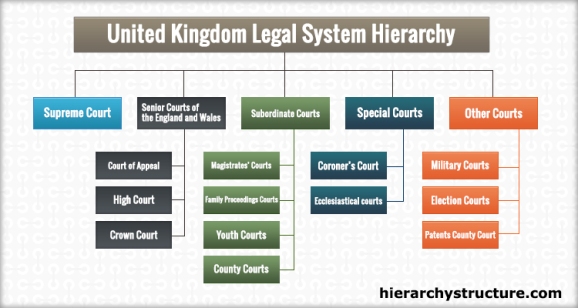In United Kingdom legal system hierarchy there are criminal and civil courts which are responsible for the governance of justice in Wales and England. These follow England and Wales’s law, English law, under the Acts of the United Kingdom’s Parliament, of which these are formed. The United Kingdom’s legal system is not single unified. Wales and England have one kind of system, Scotland has another and the Northern Ireland has a third kind. In United Kingdom legal system hierarchy, the Military Court Service has authority over all the armed forces of the United Kingdom related to the offences against the military law.
The United Kingdom legal system hierarchy is briefly explained as below in descending order which means starting with the highest level court of the hierarchy and ending with the lowest one:
Supreme Court
In United Kingdom legal system hierarchy, the Supreme Court is the uppermost court of appeal (and the final one too) in all cases in England and Wales.
Senior Courts of the England and Wales
These courts were formed by the Act of judicature as Supreme Court of the Judicature. This comprises as follows:
- Court of Appeal – Court of Appeal includes two divisions such as UK Civil court Division which hears issues from High Court, County Court along with other superior tribunals whereas Criminal Division only hears appeals from Crown Court related to a trial of a serious crime.
- High Court – High Court functions as the civil court of first request and a civil and criminal appellate court for the cases from subordinate courts.
- Crown Court – Crown Court hears criminal cases for both appellate and original jurisdiction.
Subordinate Courts
In United Kingdom legal system hierarchy, the Subordinate Court comprises of as follows:
- Magistrates’ Courts – In Magistrates’ courts issues are supervised by a lay magistrate’s bench or a district judge sitting in every area of local justice. No juries are there in these courts.
- Family Proceedings Courts – Family Proceedings Courts hears Family lawsuits which include care cases. They also have the authority to give adoption orders. It is not open for the general public.
- Youth Courts – The Youth Courts deals with the offenders which are aged between 10 to 17 years. These courts are supervised by a group of specially trained adult magistrates.
- County Courts – These courts are local courts which are there in 92 cities and towns of England and Wales. These are supervised by a circuit or district judge.
Special Courts
There are some other special courts which are as follows:
- Coroner’s Court – Coroner’s Court deals with the cases of death in suspicious conditions.
- Ecclesiastical courts – This is also a special court which deals with the matters of the properties of the Church of England.
Other Courts
The other courts comprises as follows:
- Military Courts – Supervised by military personnel in matters related to court martial.
- Election Courts – Hears petitions against the results of election.
- Patents County Court – Deals with certain simple intellectual properties.

